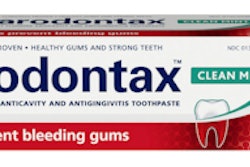The National Advertising Division (NAD) of the Council of Better Business Bureaus has recommended that Colgate-Palmolive modify or discontinue certain advertising claims for its Sensitive Pro-Relief Toothpaste, including those that state the product works faster than Sensodyne.
Both Colgate and GlaxoSmithKline (GSK), which manufactures Sensodyne, are seeking to appeal certain NAD findings to the National Advertising Review Board.
NAD, the advertising industry's self-regulatory forum, examined claims in broadcast advertising and print advertising directed at oral care professionals. Claims at issue included:
- "Gets to the nerve faster for long-lasting relief"
- "A clinically proven formula that works fast, within 2 weeks, to provide relief to the nerve and builds a protective shield to help prevent painful sensitivity flare-ups when used as directed"
- "Part of a new treatment solution for dentin hypersensitivity"
- "Rushes to the nerve for faster relief. Superior formula delivers potassium nitrate to the nerve more quickly for faster relief"
Following its review, NAD determined that the advertising at issue did not convey the message that Colgate's product provides immediate or instant relief and that the advertiser could support standalone claims that the product is effective.
However, NAD determined that the evidence in the record did not support Colgate's claims that its toothpaste works "faster" than Sensodyne to relieve pain and recommended that the advertiser discontinue "faster" claims, including both general claims to be faster and quantified claims that appear in advertising directed to professionals.
NAD recommended that Colgate either discontinue the broadcast advertising at issue or modify the advertising to ensure that it no longer conveys the unsupported "faster" message and the claim that the product is "clinically proven better" than the leading sensitivity toothpaste.
With respect to the advertising directed to professionals, NAD recommended that Colgate either discontinue its "over 30% more relief ... at 2 weeks" and "29% more relief ... at 8 weeks" claims or modify these claims by clearly disclosing that the results were only seen in one of two test methods.
Finally, NAD recommended that Colgate either discontinue the graphs that are shown in the professional advertisement or modify them so the scales do not visually exaggerate the differences between the products.
GSK is seeking to appeal a portion of NAD's decision regarding Colgate's use of the percentage differentials in materials directed to a professional audience.
Colgate, in its advertiser's statement, said the company would appeal NAD's findings that Colgate had insufficient support for certain superiority claims for Colgate Sensitive Pro-Relief vs. Sensodyne, as well as NAD's rejection of Colgate's time-to-improvement analysis.



















